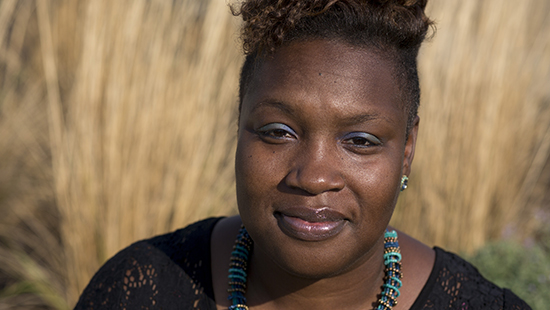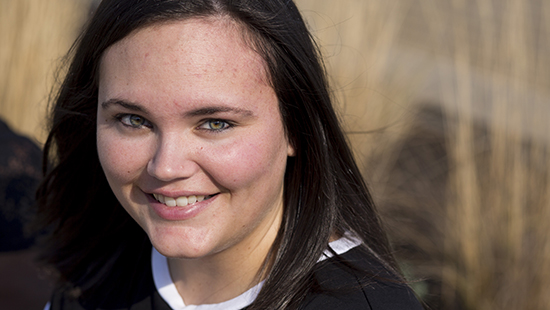Teamwork In Writing And Research
 Many successful people give generous credit for their achievements to the guidance of mentors who counseled them as young adults. At the University of Missouri–Kansas City, mentorship is a vital part of the educational experience. One of the common threads in the ongoing Our Students. Our Story. #UMKCGoingPlaces series on the UMKC site and tumblr is how students appreciate the work of their mentors.
Many successful people give generous credit for their achievements to the guidance of mentors who counseled them as young adults. At the University of Missouri–Kansas City, mentorship is a vital part of the educational experience. One of the common threads in the ongoing Our Students. Our Story. #UMKCGoingPlaces series on the UMKC site and tumblr is how students appreciate the work of their mentors.
To focus even more on those crucial mentorship relationships, we’ve created another regular feature: Dynamic Duos. In interviews and images, we’re giving you an intimate look at faculty/staff-and-student mentorship pairs at UMKC. Read the other Dynamic Duos articles.
MEET TOYA LIKE and MADELINE WARREN
Toya Like, an associate professor in the Department of Criminal Justice and Criminology in the College of Arts and Sciences, joined UMKC faculty in 2006. Like’s research specializes in victimization, deeply rooted in the event that changed her life.
“My mother was killed when I was 8 years old,” Like said. “She was murdered by someone she knew. Most victims are not victimized by strangers.”
Like received her undergraduate, master’s and doctoral degrees from the University of Missouri-St. Louis. Her work focuses on the intersection of race, gender and class as it relates to crime, victimization and justice outcomes. She explores how inequalities across these characteristics interlock to shape individuals’ experiences with crime.

Like’s course “Blackness as Threat #Blacklivesmatter” examines from a sociopolitical and criminological perspective the influence of race on perceptions of threat and danger. High profiles cases including Michael Brown in Ferguson, and Trayvon Martin in Florida were used as empirical lenses to discuss the topic. The course was developed while Like was working with a department colleague on a book chapter that focused on the Martin/George Zimmerman case. One of Like’s research projects focuses on depictions of femininity and combative behavior in reality television, analyzing whether such depictions vary by race and class.
Madeline Warren’s first graduate level class at UMKC – after five years of not being in school – was Like’s criminological theory seminar.
“UMKC opened multiple doors for me. Thanks to Dr. Like, I have been a part of multiple articles that are in the process of being published or have been published,” Warren said. “UMKC taught me the importance of research and following evidence-based practices in policy. This allowed me to obtain a position as an associate with the Crime and Justice Institute.”

The national institute is based in Boston, but Warren can work from Overland Park. Like and Warren live a few minutes from each other, and though Warren graduated in May with her master’s degree. Their frequent haunts are Houlihan’s and Starbucks, where they laugh often and continue to learn from each other.
How has Dr. Like helped you?
Warren: I am able to confidently answer questions about research, policy and theory in criminal justice. She challenged me greatly to think outside the box, and to see theories in their totality and apply them to current literature. This was greatly impactful as I was able to see the benefits and limitations of different ideas regarding what causes crime or criminal behavior. Additionally, she greatly has improved my writing and set an essential foundation for my future in writing about research.
How has Madeline helped you?
Like: She made teaching awesome. She is passionate about the subject. She was my teaching assistant, and was a godsend during frustrations with the occasional difficult student. Because she’s a go-getter and finishes everything she starts, she helps me with research projects.
Warren: We make a great writing team. I tend to be more direct, just the facts. Dr. Like brings in the research and theory-based analysis. She was the first person in the department to allow me to contribute to her work and research. She treated me as an equal, and allowed me to be a co-author on a publication. This opportunity was invaluable as I learned more about victimization trends, and I was able to prove myself to the department. With Dr. Like’s help, I was able to show my ability to work on research and write academic articles. I am forever grateful for this opportunity as it opened numerous doors for me.
Madeline, how did you choose your field of study?
When I was an undergraduate at the University of Colorado, I was a business major to begin with. I took an elective called “Social Problems,” which discussed the issue of mass incarceration in the United States. After that segment of the class, I changed my major to Sociology with an emphasis in Criminology. I have never regretted this and I wanted to continue my education in the field at UMKC. Its reputation in Criminal Justice and Criminology and its professors led me here after working as a corrections adviser.
What’s your favorite part about being a mentor?
Like: The best part of being a mentor is seeing students go from the ‘start’ to the ‘finish’ line in terms of the goals they are working towards achieving; and, knowing that you played a part in helping them actualize those goals.
What are things you admire about Dr. Like as your mentor?
Warren: I admire Dr. Like’s passion for research. When she speaks about her research, her excitement and momentum are contagious. She is thoughtful and takes others into consideration when she is delivering information. She discusses sensitive topics with evidence to support information on those topics. Additionally, Dr. Like values everyone’s opinions and does not show frustration towards any belief. She may provide documentation to refute a belief, but she does not put anyone down in doing so.
I admire her positive attitude. Every time I have left a meeting with her, I have had a smile on my face and have gained motivation to continue my work in research.
I admire Dr. Like’s ability to make theory interesting. Her classes were never dull. Again, her passion and excitement for the literature is apparent, even in her lectures. I also admire that she is a tough grader and will state how things are if need be. She will provide constructive criticism, not to be harsh, but because she truly wants students to grow and succeed.
What changes have you seen in Madeline?
Like: Madeline has become almost fearless in her ability to step into new and, at times, challenging roles. Her willingness to learn and remarkable work ethics afforded her opportunities and success – inside and outside of the classroom – both as a student, and as a teaching and research assistant in the department. Madeline did not shy away from these challenges and worked hard to excel in them, making her a standout to the faculty and a leader among her fellow students.

